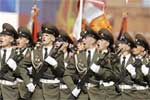RUSSIA
 |
|
New president, old habits: Russia’s overt display of military strength. |
Dmitry Medvedev was sworn in as president of Russia on May 7—and, according to plan, the next day former president Vladimir Putin became prime minister. The new cabinet, announced a few days later, looked quite a bit like the old cabinet, maintaining a fine balance between economic liberals and the hardliners who share Putin’s KGB background. Viktor Zubkov, Putin’s last prime minister, was made a first deputy prime minister, while key faces in the finance, economics and defense arenas remained the same.
As if to showcase its resurgent strength—albeit now more economic—Russia, for the first time since the Soviet era, staged a full-scale military parade on Red Square in central Moscow. Putin explained that the show of force was to demonstrate the country’s resurgent defense capability, rather than provoke concern. Meanwhile, tensions with Georgia flared up once again, with Russia increasing troop deployments near the Caucasus republic and Georgia threatening to block Russia’s efforts to join the World Trade Organization.
Evidence continued to mount that the Russian economy has managed to largely escape the reverberations of the past months of global economic turmoil, with fixed investment growing by 20.2% during the first quarter and unemployment declining by 0.2 percentage points in March to 6.4%. Real disposable income during the month rose by 7.8%, while consumption growth clocked in at an impressive 16.5%.
Kim Iskyan



